God
Vatikanet
Homosexual Priest
And
Child Abuse.
The Shocking Truth Why Pope Benedict Resigned.
The Catholic church is a beacon of light and a source of hope to many of it's followers.
The failings of it's hierarchy to uphold it's theocratic responsibility should serve as a warning to other Christian institutions of the grave consequences of their actions.
Shortest office held by a pope before RESIGNATION in almost 600 years.
Popes with the shortest reigns:
Urban VII (September 15–September 27, 1590): reigned for 13 calendar days, died before consecration.
Boniface VI (April, 896): reigned for 16 calendar days.
Celestine IV (October 25–November 10, 1241): reigned for 17 calendar days, died before consecration.
Theodore II (December, 897): reigned for 20 calendar days.
Sisinnius (January 15–February 4, 708): reigned for 21 calendar days.
Marcellus II (April 9–May 1, 1555): reigned for 22 calendar days.
Damasus II (July 17–August 9, 1048): reigned for 24 calendar days.
Pius III (September 22–October 18, 1503): reigned for 27 calendar days.
Leo XI (April 1–April 27, 1605): reigned for 27 calendar days.
Benedict V (May 22–June 23, 964): reigned for 33 calendar days.
John Paul I (August 26–September 28, 1978): reigned for 33 calendar days.
Vatican City is the smallest country in the world.
Encircled by a 2-mile border with Italy, Vatican City is an independent city-state that covers just over 100 acres, making it one-eighth the size of New York’s Central Park. Vatican City is governed as an absolute monarchy with the pope at its head. The Vatican mints its own euros, prints its own stamps, issues passports and license plates, operates media outlets and has its own flag and anthem. One government function it lacks: taxation. Museum admission fees, stamp and souvenir sales, and contributions generate the Vatican’s revenue.
St. Peter’s Basilica sits atop a city of the dead, including its namesake’s tomb.
A Roman necropolis stood on Vatican Hill in pagan times. When a great fire leveled much of Rome in A.D. 64, Emperor Nero, seeking to shift blame from himself, accused the Christians of starting the blaze. He executed them by burning them at the stake, tearing them apart with wild beasts and crucifying them. Among those crucified was St. Peter—disciple of Jesus Christ, leader of the Apostles and the first bishop of Rome—who was supposedly buried in a shallow grave on Vatican Hill. By the fourth century and official recognition of the Christian religion in Rome, Emperor Constantine began construction of the original basilica atop the ancient burial ground with what was believed to be the tomb of St. Peter at its center. The present basilica, built starting in the 1500s, sits over a maze of catacombs and St. Peter’s suspected grave.
For nearly 60 years in the 1800s and 1900s, popes refused to leave the Vatican.
Popes ruled over a collection of sovereign Papal States throughout central Italy until the country was unified in 1870. The new secular government had seized all the land of the Papal States with the exception of the small patch of the Vatican, and a cold war of sorts then broke out between the church and the Italian government.
Popes refused to recognize the authority of the Kingdom of Italy, and the Vatican remained beyond Italian national control.
Pope Pius IX proclaimed himself a "prisoner of the Vatican," and for almost 60 years popes refused to leave the Vatican and submit to the authority of the Italian government.
When Italian troops were present in St. Peter’s Square, popes even refused to give blessings or appear from the balcony overlooking the public space.
At several times during the Vatican’s history, popes escaped through a secret passageway.
In 1277, a half-mile-long elevated covered passageway, the Passetto di Borgo, was constructed to link the Vatican with the fortified Castel Sant’Angelo on the banks of the Tiber River.
It served as an escape route for popes, most notably in 1527 when it likely saved the life of Pope Clement VII during the sack of Rome.
As the forces of Holy Roman Emperor Charles V rampaged through the city and murdered priests and nuns, the Swiss Guard held back the enemy long enough to allow Pope Clement VII to safely reach the Castel Sant’Angelo, although 147 of the pope’s forces lost their lives in the battle.
Sex Scandal.
The Vatican was today rocked by a sex scandal reaching into Pope Benedict's household after a chorister was sacked for allegedly procuring male prostitutes for a papal gentleman-in-waiting.
Angelo Balducci, a Gentleman of His Holiness, was caught by police on a wiretap allegedly negotiating with Thomas Chinedu Ehiem, a 29-year-old Vatican chorister, over the specific physical details of men he wanted brought to him.
Transcripts in the possession of the Guardian suggest that numerous men may have been procured for Balducci, at least one of whom was studying for the priesthood.
The explosive claims about Balducci's private life have caused grave embarrassment to the Vatican, which has yet to publicly comment on the affair.
While Catholicism does not condemn homosexuality outright, its teaching is that homosexual acts "are intrinsically disordered".
The Catechism of the Catholic church states unequivocally: "Under no circumstances can they be approved."
Balducci was arrested on 10 February, suspected of involvement in widespread corruption. A senior Italian government official, he is alleged to have to steered public works contracts towards favoured bidders. He has not been charged.
It was during this investigation into corruption that wiretaps revealed his alleged sexual activity. In one conversation, Ehiem tells Balducci:
"I saw your call when I was in the Vatican, because I was doing rehearsals … in the choir … in St Peter's."
He then suggests Balducci meet a man who he describes is "two metres tall … 97 kilos … aged 33, completely active."
Balducci is also a senior adviser to the Congregation for the Evangelisation of Peoples, the department that oversees the Roman Catholic church's worldwide missionary activities.
Since 1995, he has been a member of one of the world's most exclusive fraternities – the Gentlemen of His Holiness, or Papal Gentlemen, the ceremonial ushers of the papal household.
In the words of a 1968 ordinance, they are expected to
"distinguish themselves for the good of souls and the glory of the name of the Lord".
According to a report by the Carabinieri for prosecutors in Florence investigating the corruption scandal, there was a hidden side to Balducci's life.
"In order to organise casual encounters of a sexual nature, he availed himself of the intercession of two individuals who, it is maintained, may form part of an organised network, especially active in (Rome), of exploiters or at least facilitators of male prostitution."
It named one as Ehiem, a professional chorister born in Nigeria. According to Italian press reports, Ehiem, a member of the choir that sings in St Peters when the pope is not officiating, lost his job on Wednesday after details of the Florence investigation became known to the Vatican.
In an interview to be published tomorrow by the news magazine Panorama, Ehiem said he had been introduced to Balducci more than 10 years ago. He claims:
"He asked me if I could procure other men for him. He told me he was married and that I had to do it in great secrecy."
There were conflicting accounts of how the Vatican might respond. According to one source, there was no provision for the dismissal of a Gentleman of His Holiness. Another said:
"We shall wait for the judiciary's definitive verdict."
The transcripts imply that over a period of around five months in 2008, Ehiem procured for Balducci at least 10 contacts with, among others, "two black Cuban lads", a former male model from Naples, and a rugby player from Rome.
Balducci's lawyer, Franco Coppi, said tonight:
"I have no comment. First, because we have more serious questions to tackle. Second, if these claims are correct, they regard his private life. It is disgraceful that these transcripts, which have nothing to do with the case, should have been spread about."
In January this year, the Carabinieri recorded an exchange in which Balducci and Ehiem discuss a seminarian, or student for the priesthood.
Balducci is said to have asked:
"Listen, have you spoken with the seminarian by any chance?"
Ehiem says he is "probably at mass or something". On 11 January, Ehiem calls again to recommend "a colleague, a friend" of the seminarian because the latter is unavailable.
He says the colleague is "better, taller, a bit taller than you".
Later, Ehiem asks:
"Can I send (him) around straight away?"
He asks where Balducci is.
The adviser says: "Up at the seminary … where the cardinal lives."
Ehiem replies: "He could get there within half an hour … the time it takes to catch a taxi and get there.".
Pope Benedict XVI officially resigns.
Benedict XVI has became the first pope in 600 years to resign, ending an eight-year pontificate after flying from the Vatican to the pontiff's traditional Summer residence of Castel Gandolfo.
In his final public address as pope, he pledged to continue working for the good of the church in his retirement. He told a packed piazza from the palace balcony that as of his retirement, "I am simply a pilgrim beginning the last leg of his pilgrimage on this Earth."
As bells tolled, the Swiss Guards standing at attention in Castel Gandolfo shut the doors of the palazzo shortly after 8pm (local time), symbolically closing out the papacy.
The shadow cast over the Catholic church by abuse scandals continued to be felt as a victim support group held a press conference metres from the walls of the Vatican City to ask the UN to censure the Vatican for failing to protect children from sexual abuse by Roman Catholic clergy.
In an apparent attempt to defuse growing concerns that his abdication, Benedict pledged earlier his "unconditional reverence and obedience" to whoever succeeds him as head of the Roman Catholic church.
So what now? With the throne of St Peter declared empty, a period known as the "interregnum" has formally begun.
Meanwhile,it is expected that the conclave of Cardinals due to select a new leader of the world's 1.2 billions Catholics could start as soon as next week.
Whoever they decide upon faces a daunting list of challenges, which the Guardian's Andrew Brown has been looking at.
Here's a snatch from Andrew's piece:
"It seems to me that there are three interlocking difficulties for the church. There is crisis in the curia, the Vatican itself. There is a crisis in the clergy. And in the developed world, there is a crisis in the laity.
There is also a strategic problem in that the church must deal with the increasing militancy of Islam in the Middle East, and, beyond that, the rise of China and India. But that doesn't require new thinking, just the application of well-practised principles.
The problems of the laity and clergy are intertwined, and in the developed world their symptom is obvious: there are not enough of either, and both are ageing rapidly and sustained only by immigration from the south.
There is little that a pope can do directly about the problem of the shrinking laity, even in an age of global travel. Wherever he goes, he can draw vast crowds, but the interest and excitement subside when he has gone. The congregations continue to drain away."
With the departure of Benedict, Vatican tradition holds that his official papal ring should also be destroyed using a hammer.
Responsibility for smashing the ring, which shows St Peter fishing, is given to ‘camerlengo’ or chamberlain. On this occasion, that is Tarcisio Bertone, the Vatican Secretary of State.
Monsignor Paul Tighe, Secretary of the Pontifical Council for Social Communications, told the magazine that the account will hibernate, not close, until the new pope is chosen.
“During the period between today and the election of new pope the account will be inactive,” he wrote in an email, “not shut down.”
The account, which has more than 1 million followers, is tonight "Sede Vacante", an expression referring to the "vacant seat".
As the clock strikes 8pm in Italy, the retirement of the first Pope for 600 years has taken effect.
In a scene rich in symbolism, members of the Swiss Guard have just marched away from the entrance to the pontiff's Summer residence at Castel Gandolfo.
The guards return to Rome now as papal authority passes away from Benedict XVI.
In their place, Italian police have taken up position.
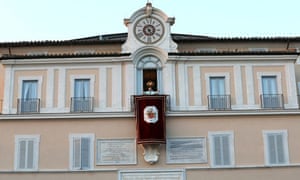
On plush 5th Avenue in midtown Manhattan - the location for New York’s main Catholic church - most worshippers preparing for a special mass at St Patrick’s Cathedral to mark Pope Benedict XVI’s last day in office appear to have been decidedly unmoved by the drama unfolding across the Atlantic.
From there, the Guardian's Paul Harris has filed this:
As they trickled into the church – far outnumbered by the hordes of lunchtime office workers and eagerly shopping tourists outside – few expressed anything but acceptance at the once-in-the-last 600 years event.
“He’s like everyone else. Once you get a certain age you don’t want to work anymore,” said Horacio Ochoa, a 57-year-old computer worker who comes to St. Patrick’s every working day of the week anyway.
That was a common sentiment. Vesna Cabraja, a 49 year old businesswoman from Queens, said that she understood why the Pope was standing down from his office.
“He is too old. He looks tired. If I was his age I would choose to do the same,” she said. She explained that she had few strong opinions about who should be the next Pope as she was willing to accept the will of the Church whatever that should be. However, she did have one suggestion. “They should choose younger Popes,” she said.
St Patrick’s is a New York landmark but it is currently covered in scaffolding as it goes through a major refit. The banners hanging down from outside reflect that challenges – and perhaps opportunities – of lying in the heart of a city not exactly known for its religious fervour. “In a city that never sleeps, everyone needs a place to pray,” one read, perhaps optimistically. In a nod to modern mores that might appeal to church reformers another banner suggested passersby check out St Patrick’s on Twitter .”Follow us @stpatsnyc” it said.
But Ochoa remained more old school. When asked who he would like to see as a new Pope, he was looking to the past for inspiration. “I want another John Paul II maybe. I thought everything of him. He was exactly what a Pope should be,” he said.
Benedict XVI's final public words as Pope, spoken to to well-wishers gathered at the papal vacation retreat of Castel Gandolfo, south of Rome:
Dear friends, I'm happy to be with you, surrounded by the beauty of creation and your well-wishes which do me such good. Thank you for your friendship, and your affection.
You know this day is different for me than the preceding ones: I am no longer the Supreme Pontiff of the Catholic Church, or I will be until 8 o'clock this evening and then no more.
I am simply a pilgrim beginning the last leg of his pilgrimage on this Earth. But I would still ... thank you ... I would still with my heart, with my love, with my prayers, with my reflection, and with all my inner strength, like to work for the common good and the good of the church and of humanity. I feel very supported by your sympathy.
Let us go forward with the Lord for the good of the church and the world. Thank you, I now wholeheartedly impart my blessing. Blessed be God Almighty, Father, Son and Holy Spirit. Good night! Thank you all!
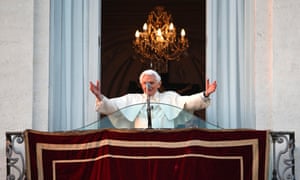
A victim support group has held a press conference metres from the walls of the Vatican City to ask the United Nations to censure the Vatican for failing to protect children from sexual abuse by Roman Catholic clergy.
The head of the Survivors Network of those Abused by Priests (SNAP) said his group had made a formal submission to the UN Committee on the Rights of the Child.
"It's a long submission of 30 pages based on government reports by five different nations," David Clohessy told reporters, surrounded by photographs of children he said were members of his organisation, at the age they were abused.
"We hope that the UN speaks out very forcefully and says that the Vatican is in violation of the treaty that it agreed to honour."
The SNAP submission argues that the Holy See has violated the UN Convention on the Rights of the Child, which it signed in 1990, on four counts including a failure to cooperate with criminal investigations and failing to protect children.
It's an issue of clerical abuse and its handling by the Catholic hierarchy is one that has continued to overshadow Benedict's reign. Here's a video put together which during his 2010 visit to the UK by the Guardian's Cameron Robertson who followed a US-born survivor of abuse as she conducted a public campaign for new safeguards.
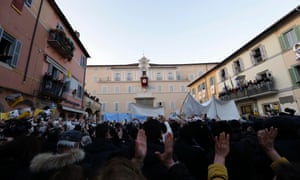
He's thanking them and telling then that he is going to become "a pilgrim about to start his last journey on Earth".
"A heartfelt thank you," he says, giving a blessing, before disappearing back inside.
Before leaving the Vatican for the pope's vacation retreat at Castelo Gandolfo, Benedict held his final audience with his cardinals and pledged his "unconditional reverence and obedience" to his successor, a poignant and powerful message to close out his eight-year pontificate which officially ends at 8 pm Thursday.
In an unexpected address inside the Vatican's frescoed Clementine Hall, the Pope appeared to be trying to defuse concerns about his future role and the possible conflicts arising from the peculiar situation of having both a reigning pope and a retired one.
Benedict also gave a final set of instructions to the "princes" of the church who will elect his successor, urging them to be united as they huddle to choose the 266th leader of the world's 1.2bn Catholics.
"May the College of Cardinals work like an orchestra, where diversity an expression of the universal church always works toward a higher and harmonious agreement," he said.
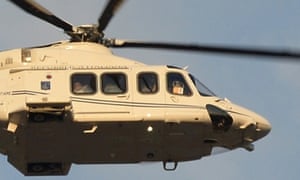
He has arrived now at Castel Gandolfo. A picture of him being received by local clergy is below (via NBC).
A motorcade carrying him is now off and running through roads with picturesque green fields on either sides. Seems a more than pleasant place to hang up the red Pradas as he devotes the rest of his life to prayer and looks back on his career.
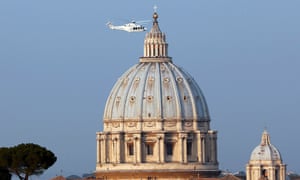
Benedict's resignation is part of a wider "global crisis, according to Jean Marie Guenois, Chief Editor of Figaro, where he is in charge of religious affairs.
In a new post for for Corriere Della Sera entitled 'Is there a captain on Peter's boat?' he writes of how he feels that the Earth is moving not just in Rome but across Italy more broadly:
The uncertainty resulted from Italy’s election polls on Monday night is emphasising this sense of crisis and instability.
No matter how much the Holy See is declaring its independence and rejecting any outside influence on the management of Church affairs and the election of the new Pope, it is hard to believe.
We understand, but the context of the succession of Pope Benedict XVI is disturbed by various factors, outside and inside the Catholic Church. His resignation is part of a global crisis. It is not reassuring.
He's five minutes into his journey over Rome now and making his way south. Swiss guards have meanwhile appeared at gates of Apostolic palace in Castel Gandolfo, says Lizzy Davies.
The bells of St Peter's are ringing out as the Pope's helicopter lifts off. Looking down on the Vatican, he might be able to make out some of the banners on the ground that have been put together with a view to catching his eye from the air.
"Danke" says one in his native language in St Peter's Square. In just under three hours time he will effectively become a private individual.
After winding its way through the Vatican's inner walls, the Pope's motorcade has arrived at a helipad, where a chopper emblazoned with the words "Repubblica Italiana" is due to depart shortly.
It will circle over St. Peter's Square before heading to the scenic town, where Benedict will make his final public appearance as Pope.
He's boarding now. By his side, as he has been for so long, is Georg Ganswein, a German Archbishop who has been the Pope's personal secretary.
What's going through his mind? The last few weeks will probably have been among his most stressful.
It's a short drive now in a Mercedes under police escort to take him to the helicopter. Applause from those left behind.
The Pope is coming out of his private apartments now at the Vatican and is saying farewell to his staff and senior officials from the Vatican's Secretariat of State.
Meanwhile, his helicopter is being readied for take-off. Here's a little break-down of how the rest of the evening is expected to unfold.
4pm The Papal helicopter flies to Castel Gandolfo near Rome.
5pm Benedict will appear at a window overlooking the public square in Castel Gandolfo.
7pm: Benedict ceases to be pope.
Pope Benedict XVI has pledged his "unconditional reverence and obedience" to whoever succeeds him as head of the Roman Catholic church as he prepares to stand down.
Lizzy Davies has filed from Rome on what appears to be an attempt to defuse growing concerns that his abdication – the first in almost 600 years – would sow further division among the church.
Towards the end of a speech in the Clementine Hall of the Apostolic Palace, he told assembled cardinals in the Vatican they should be unified in their future action:
Before greeting you individually, I would like to tell you that I will continue to be close to you in prayer, especially in the coming days.
Among you is the future pope, to whom I promise my unconditional reverence and obedience.
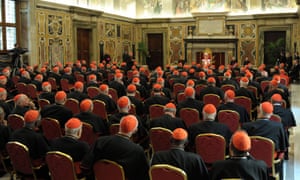
It leaves the world’s 1.2bn Roman Catholics leaderless - albeit not for very long.
All roads currently lead to Rome for the 115 Cardinals expected to take part in voting on the next Pope.
As well as covering the build-up to that, today we'll be monitoring the final engagements of Benedict XVI as head of the Roman Catholic church before he departs for the hilltop town of Castel Gandolfo, where he is expected to spend the next two months.


Ingen kommentarer:
Send en kommentar